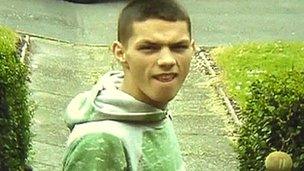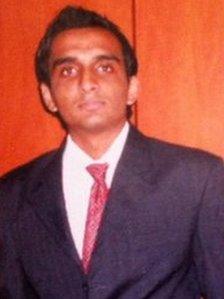Anuj Bidve murder 'impossible to explain'
- Published

A defence forensic psychiatrist described Stapleton as "unpredictable"
Why Kiaran Stapleton walked up to Anuj Bidve and shot him in the head on Christmas Day night is "impossible to explain," police have said.
The conclusion that it was a "motiveless" killing follows Stapleton being found guilty at Manchester Crown Court of the murder of the 23-year-old Indian student.
During his trial, 21-year-old Stapleton was asked why he had shot the student. "I honestly don't know," he replied.
That lack of motive was something that police tried to fathom following his arrest.
Detectives who interviewed him said he had no mental health issues, there was no evidence of a racial motive, nor was he drunk, on drugs or medication.
Det Supt Mary Doyle of Greater Manchester Police said there was nothing to suggest the murder had any link to "organised criminality".
Mr Bidve, she said, was simply "in the wrong place at the wrong time".
'Calm mood'
He was a young masters student at Lancaster University, who had travelled with a group of friends to Manchester for the Boxing Day sales.

Mr Bidve was visiting Manchester for the post-Christmas sales
They left their hotel in Trafford Park to join sales queues at 00:45 GMT on 26 December last year and followed a mobile phone map along Salford's Ordsall Road and past the Bricklayers Arms, where they met two men.
One of the pair, Stapleton, who lived nearby on Regent Square in Ordsall, stopped them and asked for the time.
As he received a reply, he drew a pistol, shot Mr Bidve in the head and ran off with the other man.
By 29 December, information and CCTV gathered from a nearby petrol station had led officers to Stapleton, who was hiding in a house in Leigh.
He was known to police and had family connections to gang culture, yet Ms Doyle said there was no evidence to suggest the murder had any link to "organised criminality".
She said there was nothing to suggest Stapleton's attack was racially motivated, as had been suspected, nor was he thought to have been drunk or under the influence of drugs.
This was underlined by Stapleton's responses at his trial. He said he had not been "feeling angry and I was not feeling sad", that he was in a "normal, calm mood" and had "just raised my hand, shot [the gun] and then ran".
The testimony of two defence witnesses, a psychologist and a forensic psychiatrist, suggested that, while he was not a psychopath, there was a problem with how Stapleton expressed emotions.
Psychologist Dr Sanya Krljes said Stapleton had a history of behavioural problems, dating back to school where he had been expelled more than once for fighting.
She said her interviews with him had revealed that his mind "went blank" when involved in violence and that he had told her that, while "people think I'm a monster, I was working, a normal boy, had money, I had no drugs in my system".
She added that he was concerned "something is wrong with my brain" and he "could do it again to someone else".
Forensic psychiatrist Professor Nigel Eastman went further and said when he interviewed Stapleton in prison, he felt "anxious" and was "concerned" for his own safety.
'Not the brightest'
He said Stapleton had shown "no evidence of any real understanding of the emotional significance of what he's done".
"To most people it would seem just very odd to go up to someone, a stranger, and shoot them," Prof Eastman said.
"I think what he's demonstrating is his very substantial lack of ability to feel what other people feel. I don't think he has any real feeling for what he's done."
He added that the 21-year-old was "not the brightest button in the box", had a "grandiose opinion" of himself and was "unpredictable".
However, the prosecution argued Stapleton had no mental health problems and was not taking any medication. His plea of manslaughter by reason of diminished responsibility was rejected.
Ms Doyle said that despite two previous convictions, for road rage and burglary, Stapleton was, as far as police were concerned, "completely unremarkable".
"He was similar to other people in that area - [there was] no suggestion that he would go on to do something like this."
- Published11 July 2012
- Published9 July 2012
- Published6 July 2012
- Published5 July 2012